Leave Letter For Death
Subject: Request for Bereavement Leave
Dear [Recipient's Name],
I hope this letter finds you well. I am writing to inform you of a tragic incident in my life that requires my immediate attention and presence. I regret to inform you that [Name of the deceased], a close family member of mine, has passed away.
The loss of my [relation to the deceased] has deeply affected me, and I am filled with grief and sorrow during this difficult time. I am requesting [number of days] days of bereavement leave to make necessary arrangements, attend the funeral, and spend time with my family to cope with this loss. I understand that this may cause some inconvenience to the company, and I apologize for any disruption caused.
I will make every effort to ensure a smooth transition of my responsibilities before I leave. If there are any urgent matters or pending tasks that require immediate attention, please let me know, and I will do my best to complete them or delegate them to a colleague.
I will provide any supporting documentation, such as a death certificate or funeral program, if required by the company's bereavement leave policy. Please let me know if there are any specific procedures or forms that need to be completed in order to proceed with my leave request.
I understand the importance of my work and the responsibilities that come with it, and I assure you that I will be fully committed to my duties upon my return. I anticipate being able to resume work on [date of return].
I am grateful for the understanding and support of the company during this difficult time. If there are any additional requirements or procedures I need to follow, please do not hesitate to inform me. I am available via email or phone to discuss any matters related to my absence.
Thank you for your attention and consideration. I look forward to your positive response.
Yours sincerely,
[Your Name]
Formal Leave Letter for Death of a Family Member
Subject: Request for Bereavement Leave
Dear [Manager's Name],
I am deeply saddened to inform you of the passing of my [relation, e.g., father/mother]. I would like to request leave from [start date] to [end date] to attend the funeral and be with my family during this difficult time.
I apologize for any inconvenience my absence may cause and will ensure that all urgent tasks are delegated or completed before my leave. Thank you for your understanding and support.
Sincerely,
[Your Name]
Quick Leave Request Email for Death
Subject: Leave Request Due to Bereavement
Hi [Manager's Name],
I am saddened to share that my [relation] has passed away. I need to take leave from [start date] to [end date] to attend the funeral.
Thank you for your understanding.
Best regards,
[Your Name]
Heartfelt Leave Letter for Death of a Loved One
Subject: Bereavement Leave Request
Dear [Manager's Name],
It is with a heavy heart that I inform you of the passing of my [relation]. I kindly request leave from [start date] to [end date] to mourn and support my family during this painful time.
I greatly appreciate your understanding and support, and I will ensure that all pending work is appropriately managed prior to my leave.
Sincerely,
[Your Name]
Informal Leave Message for Death
Subject: Request for Leave
Hi [Manager's Name],
I am very sad to inform you that my [relation] has passed away. I will need leave from [start date] to [end date] to attend the funeral and be with my family.
Thank you for your understanding.
[Your Name]
Professional Leave Letter for Death of a Colleague's Family Member
Subject: Leave Request Due to Bereavement
Dear [Manager's Name],
I am writing to request leave from [start date] to [end date] following the passing of my [relation]. I will ensure that my responsibilities are appropriately covered during my absence.
I appreciate your support and understanding in this difficult time.
Sincerely,
[Your Name]
What / Why is a Leave Letter for Death
A leave letter for death is a formal communication requesting time off due to the death of a family member, close friend, or loved one.
- Purpose: To inform management of the need for absence and provide dates for bereavement leave.
- Importance: Ensures clarity, professional etiquette, and enables planning for work coverage during absence.
Who Should Send a Leave Letter for Death
- Any employee experiencing the death of a close family member or loved one.
- Individuals who need time to attend funerals, support family, or manage related matters.
- Can be sent by full-time, part-time, or contractual employees.
Whom Should the Leave Letter for Death Be Addressed To
- Direct supervisor, line manager, or department head.
- Human Resources department if required by company policy.
- In some organizations, both supervisor and HR should be notified.
When to Submit a Leave Letter for Death
- As soon as the employee becomes aware of the death.
- Prior to attending the funeral or memorial services if possible.
- For sudden or unexpected deaths, submit the letter at the earliest convenience, even if short notice.
How to Write and Send a Leave Letter for Death
- Start with a clear subject indicating leave request.
- Mention the deceased relation and reason for leave.
- Specify the start and end dates of the leave.
- Offer assurance about handling urgent tasks if applicable.
- Maintain a respectful and professional tone.
- Send via email for quick notification; printed letter can be used for formal HR documentation.
Requirements and Prerequisites Before Sending
- Identify the relation of the deceased to yourself.
- Determine the dates needed for absence.
- Review company bereavement leave policy.
- Notify relevant colleagues if responsibilities need temporary coverage.
- Gather supporting documents if required by HR (e.g., death certificate).
Formatting Guidelines for a Leave Letter for Death
- Length: Keep it concise; 2–3 paragraphs are sufficient.
- Tone: Serious, respectful, and empathetic.
- Wording: Clear explanation without unnecessary detail; mention relation and dates.
- Mode: Email for immediate notice, printed letter for HR records.
- Etiquette: Avoid emotional exaggeration; maintain professionalism.
FAQ About Leave Letters for Death
- Q: How many days of leave can I request?
A: Typically 3–10 days, depending on company policy and relation to the deceased. - Q: Should I provide a death certificate?
A: Some organizations may require proof, especially for extended leave. - Q: Can I extend my leave if needed?
A: Yes, request an extension formally if circumstances require it. - Q: Is it acceptable to send a short notice email?
A: Yes, in cases of sudden death, quick email notification is appropriate.
After Sending / Follow-up Actions
- Confirm receipt of leave request with supervisor or HR.
- Coordinate handover of urgent tasks if applicable.
- Keep in touch if circumstances change or leave needs to be extended.
- Express gratitude upon return for understanding.
Tricks and Tips for Writing a Leave Letter for Death
- Be concise yet clear about dates and relation.
- Maintain respectful tone; avoid unnecessary personal details.
- Notify colleagues or team to manage responsibilities.
- Use official email for quick acknowledgment.
- Keep a copy for your personal records or HR documentation.
Common Mistakes to Avoid
- Delaying notification to supervisor or HR.
- Omitting specific dates or relation details.
- Being overly emotional or including irrelevant information.
- Forgetting to mention arrangements for pending work.
- Neglecting company policy on bereavement leave.
Elements and Structure of a Leave Letter for Death
- Subject Line: Clearly state leave request (e.g., "Bereavement Leave Request").
- Greeting: Address supervisor or HR politely.
- Introduction: State reason for leave (death of relation).
- Body: Specify relation, start and end dates, and responsibilities.
- Closing: Express gratitude and understanding.
- Sign-off: Name and designation if applicable.
- Attachments (Optional): Death certificate or supporting document if required.
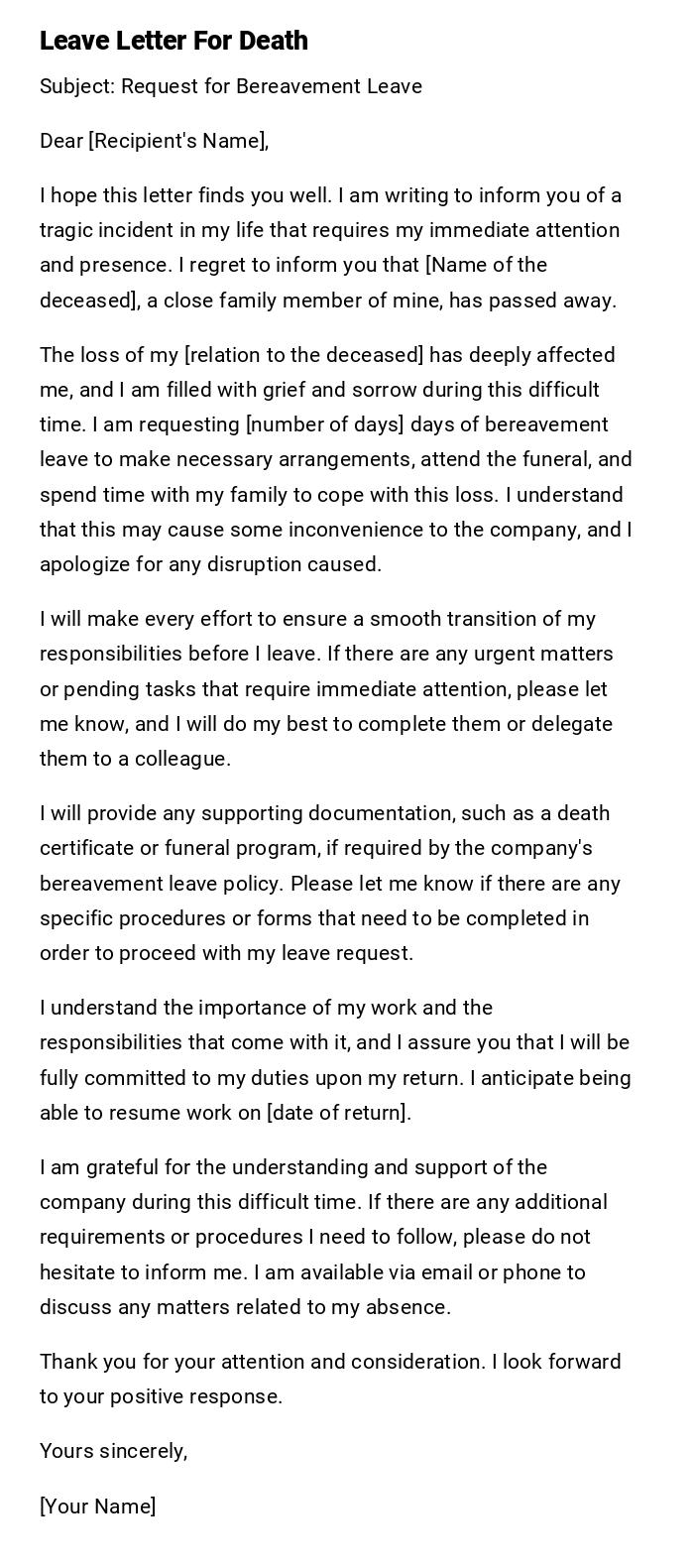
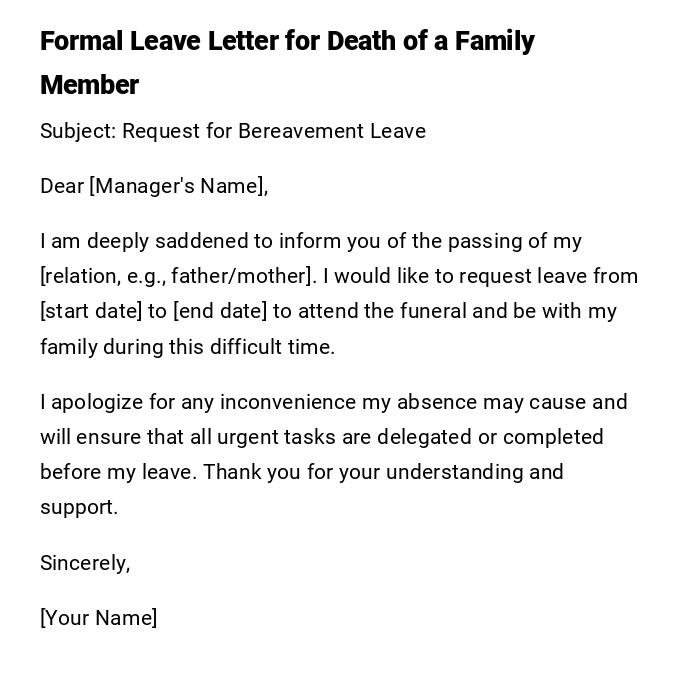
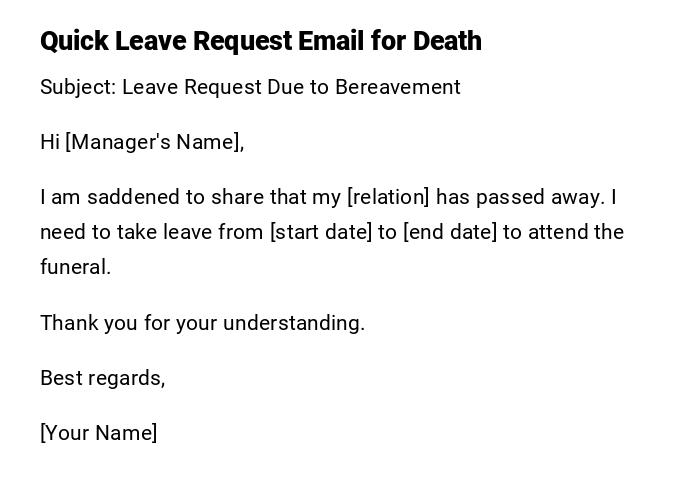
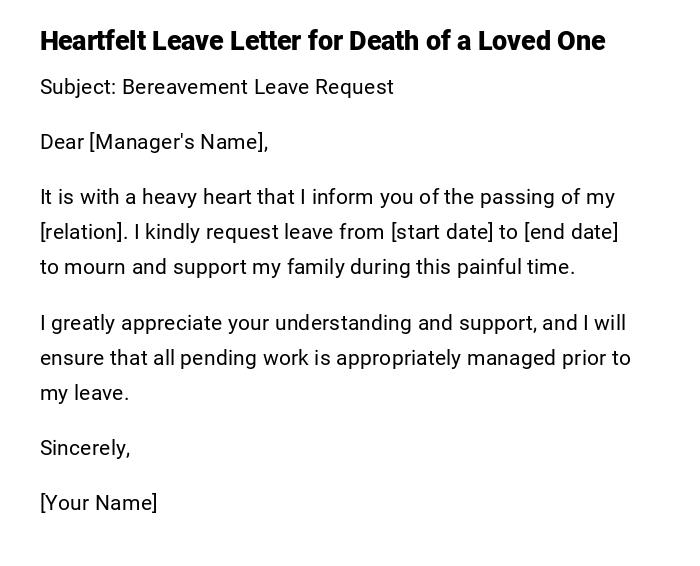
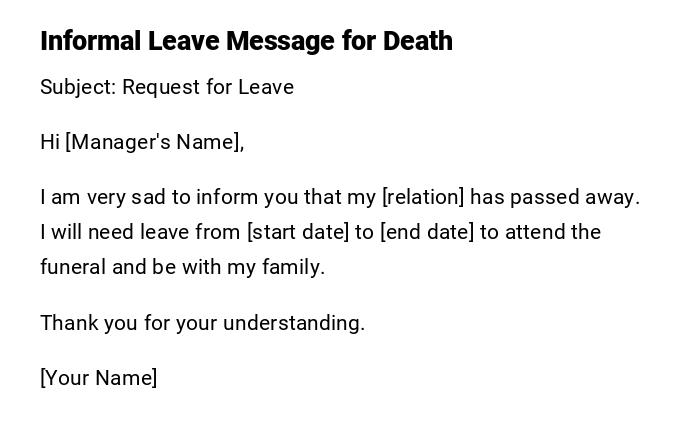
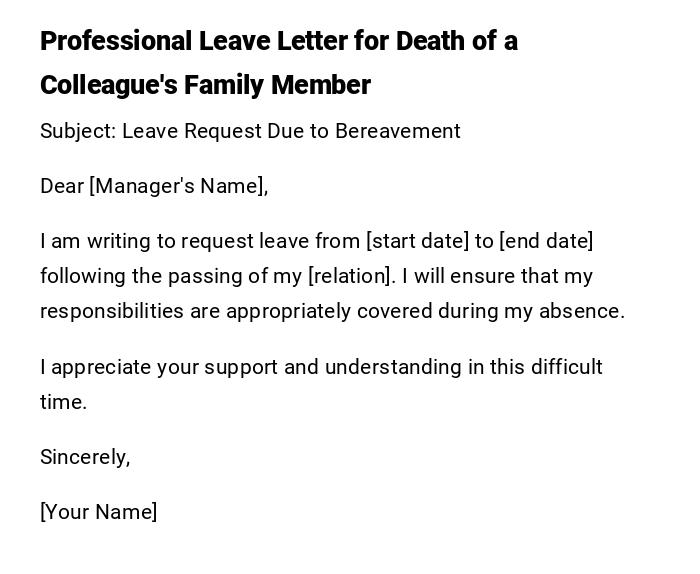

 Download Word Doc
Download Word Doc
 Download PDF
Download PDF